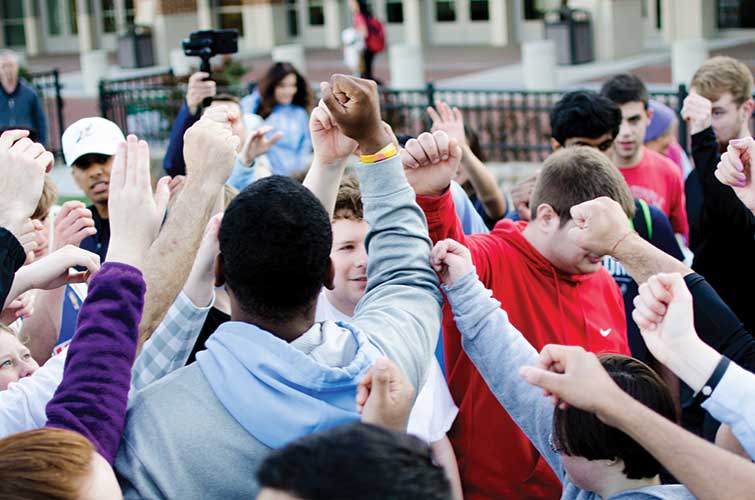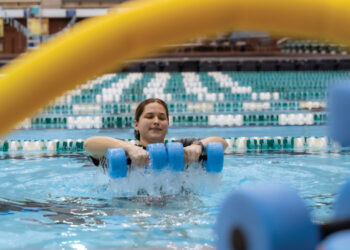For several years, Campus Recreation at the University of Massachusetts Lowell (UMass Lowell) partnered with the Office of Multicultural Affairs to provide inclusive training for staff members. After one training, Peter Murray, the director of Campus Recreation, spoke to a student who expressed they felt inclusion training was just another box to check off and not something that was important to Campus Recreation.
This sparked Murray to believe if students were going to see inclusion as a primary value of Campus Recreation, his team needed to take a leadership role in equity, diversity and inclusion (EDI) training, rather than bring in another department to do the work.
Still working closely with the Office of Multicultural Affairs, the Inclusive Campus Recreation (ICR) team — consisting of several student employees from different program areas and professional staff — was created to focus on training, outreach and assessment of all programs, policies and facilities.
Training
“In the beginning, we focused on reviewing our department and improving our programs and policies, then worked as a group to develop our initial ICR trainings,” said Murray. “These trainings have evolved over time to include a Level 1 and Level 2 as we found the needs and readiness of our new students were much different than returning staff members.”
The ICR Team provides EDI training for all campus recreation staff and club sport leaders, consisting of Level 1, Level 2 and a Club Sport specific training.
- Level 1 and Club Sport: Introduces concepts of inclusion being a value of Campus Recreation, vocabulary identity, microaggressions and how to be an ally within Campus Recreation.
- Level 2: Reviews a lot of Level 1, but takes it a step further and looks at power and privilege, and how it plays out at an individual, group and system level.
In addition to these trainings, ICR reaches out to various groups on campus to understand their experiences and incorporates feedback to make programs and services more inclusive. “The trainings help our staff understand they have the power to make Campus Recreation more welcoming for people of all identities,” said Murray. “We can address poor behaviors that make our programs and facilities unwelcoming, then we can move toward creating an environment that allows all students to feel like they are seen, heard and valued.”

Outside of trainings, the ICR team meets once a month to discuss current issues and how to address them as a group. “You may not typically expect a recreation center to spark an in-depth dialogue about a current social issue, but we encourage this as a way to connect, learn and grow ourselves, and also model to our students, guests and campus community we are striving to walk the talk and our actions mean just as much as our convictions,” elaborated Murray.
Workplace Placement Program
At Temple University, Anne Wilkinson, the associate director of assessment, training and marketing for Campus Recreation, worked with Disability Resource and Support Services and Student Center Operations staff to create the workplace placement program that supports students who identify with a disability by streamlining the application, hiring and work process to help them get positions within Campus Recreation.
Within the program, accommodations are made for training, shifts and workplace requirements. “This helps build job history and experience they may not have been able to get elsewhere, and could help with building their resume for after college,” said Wilkinson. “It has grown to include other grant programs at the university, and I’ve also shared the model with other university departments.”
Sports Programming and Equipment
Additionally within Campus Recreation at Temple, the adapted recreation program offers extracurricular activities for students with disabilities, such as the workout buddy program. This program matches students with disabilities with a student assistant to help them in their selected workout. Tennis, handcycling, rowing and fitness conditioning are some of the available activities.
Campus Recreation at the University of North Carolina Chapel Hill (UNC Chapel Hill) also offers a number of adaptive programs, including unified flag football and kickball, sit-down volleyball and goalball, as well as wheelchair basketball and adapted kayak clinics, made possible through a collaboration with Bridge II Sports.

“Creating an inclusive culture within recreation must be done with intentionality, purpose and consistency,” said Tori Hooker, the senior assistant director of Sports Programs at UNC Chapel Hill. “A recreation center doesn’t suddenly become inclusive — it is a process and one I would argue is never truly complete.”
Hooker further suggested seeking input from students and patrons with a variety of physical abilities in order to truly make your rec center a welcoming place. One common suggestion is simply offering accessible equipment in your facility for members to use.
At UNC Chapel Hill, patrons have access to the Precor FTS Glide with user-defined paths of motion, the SciFit Pro1 Upper Body that features a wheelchair platform, and Freemotion selectorized equipment that allows patrons to strengthen single or multiple muscle groups at one time. Images demonstrating how to use the equipment are displayed on the Campus Recreation website.
Creating the Culture
Your department can train, create a workplace placement program and offer a variety of sports and equipment for patrons with disabilities, but what will make the difference for adaptive recreation within your facility is the inclusive culture your team creates.
“If you want your students to believe inclusion is a fundamental value of your department, you need to own that experience by directly influencing change and modeling EDI every day,” said Murray. “Our commitment to changing unhealthy or biased notions and assumptions requires us to practice and infuse EDI into all we do — an ongoing commitment to our patrons and prioritizing EDI as a departmental value.”










